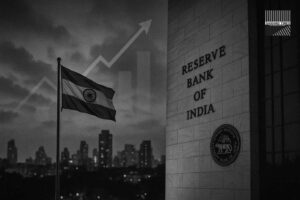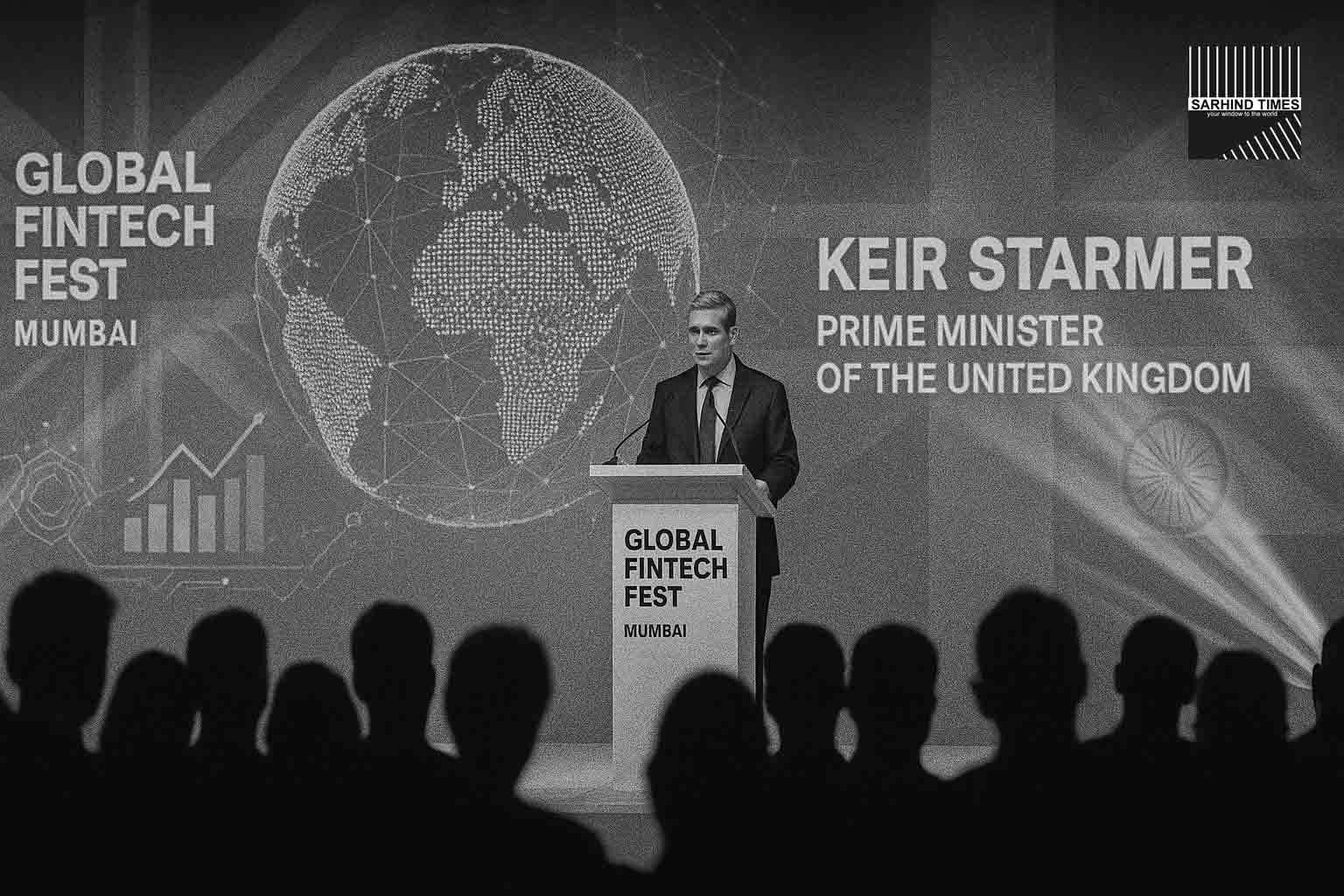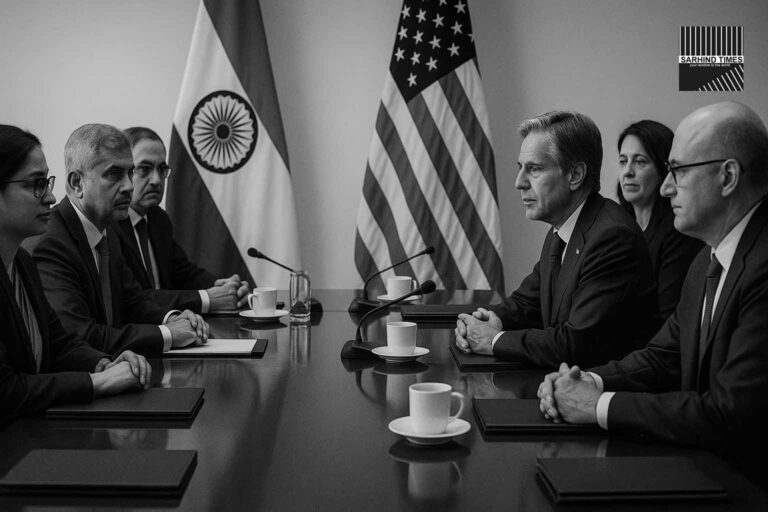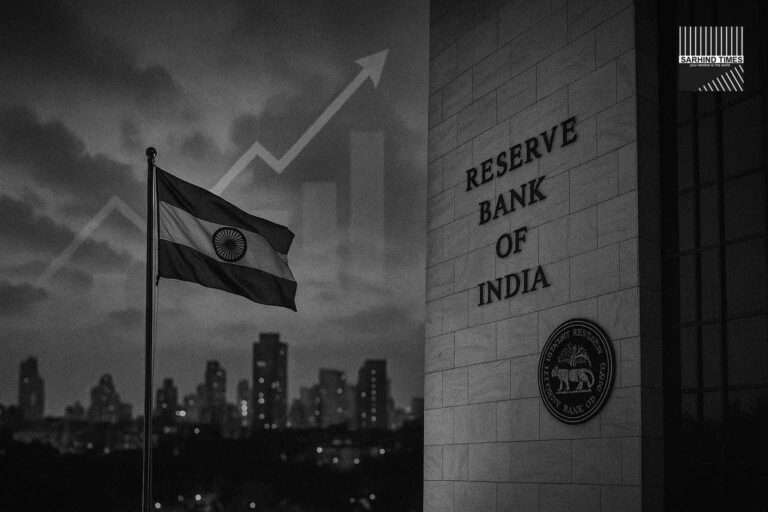In Mumbai, UK Prime Minister Keir Starmer projects London as India’s long-term collaborator in fintech and digital public infrastructure as both nations eye deeper capital and innovation flows.
By SarhindTimes Bureau
Mumbai, October 2025
Fintech Diplomacy Finds Its Moment
At the Global Fintech Fest 2025 in Mumbai, British Prime Minister Keir Starmer struck a confident and collaborative note: “The United Kingdom is India’s partner of choice in financial technology.”
In an address watched closely by policymakers, bankers, and entrepreneurs, Starmer framed fintech not just as a business opportunity but as the “connective tissue” of modern economies, linking regulation, trust, and innovation across borders.
His remarks came amid an inflection point for UK–India relations, as both countries negotiate a comprehensive trade agreement and seek new avenues of cooperation beyond goods and traditional services.
“Our partnership must now extend to digital public goods, fintech governance, and sustainable capital. India’s digital infrastructure and the UK’s financial ecosystem are complementary strengths,”
Starmer told delegates, underscoring the potential for joint leadership in an era of AI-enabled finance.
A Relationship Built on Numbers and Trust
The numbers already tell a compelling story.
According to UK government data cited at the event, services trade between India and the UK has doubled over the past four years, reaching more than £26 billion in 2024.
While goods trade often dominates headlines, it is the services corridor — finance, technology, consulting, education — that has become the real growth engine. Fintech now sits squarely at that intersection.
“Both economies are proving that financial innovation and regulation can coexist. The UK brings experience in governance; India brings scale and agility,”
said Anand Mahindra, Chairman of the Mahindra Group, who shared the stage during a leadership dialogue.
London Offers Its Deep Capital Pool
For Indian startups, the City of London remains a prized destination — not merely for fundraising but for global validation.
Starmer used the platform to reiterate that UK capital markets, regulatory expertise, and compliance infrastructure can help Indian fintechs transition from domestic champions to global players.
He highlighted the UK’s ongoing initiatives, including regulatory sandboxes, open-finance frameworks, and green-fintech incentives, which could become natural extensions for Indian innovators looking abroad.
“London is open — not just to listings, but to partnerships, co-development, and knowledge exchange,”
Starmer said, evoking a continuity of confidence from Britain’s long-standing financial hub.
India Brings Digital Infrastructure and Scale
If the UK offers depth, India brings unmatched digital breadth.
Starmer’s speech acknowledged India’s digital public infrastructure (DPI) — the Unified Payments Interface (UPI), Aadhaar, and Open Credit Enablement Network (OCEN) — as “world-leading platforms that have democratized access to finance.”
For British firms exploring digital inclusion, India’s fintech ecosystem serves as both a testbed and a learning lab.
“The UK sees India not just as a market but as a model,”
noted Emma Howard Boyd, UK envoy for sustainable finance.
“From instant payments to AI-driven micro-credit, the systems being built here are influencing regulation globally.”
Why Fintech Is the New Bridge
In geopolitics, fintech has become a soft-power tool — shaping how countries collaborate on data, standards, and payments.
The UK–India partnership fits neatly within this new architecture.
Both nations are rule-of-law democracies with mature regulatory institutions (the RBI and the Financial Conduct Authority) and an openness to sandboxed innovation.
The synergy is evident:
- India’s population-scale digital rails + the UK’s global compliance and capital depth = a model for interoperable finance.
- Joint research on cybersecurity, AI risk analytics, and cross-border payments could define the next phase of fintech diplomacy.
“It’s not just trade — it’s the co-creation of digital norms,”
said Dr. Ruchir Sharma, economist and author.
“This partnership can show how data can flow with trust.”
Context: Trade Talks and Timing
Starmer’s Mumbai visit carries timing that extends beyond optics.
Negotiations for a UK–India Free Trade Agreement (FTA) are in advanced stages, with financial services and data flows among the most debated chapters.
The fintech overture signals Britain’s intent to re-anchor post-Brexit global finance through strategic digital partnerships — and India, with its growing fintech unicorn base, is central to that vision.
Officials accompanying Starmer described fintech cooperation as a “low-politics, high-impact” area — one that can progress irrespective of trade deal pace.
“We can build shared infrastructure, even as trade negotiators work out tariff details,”
said Jonathan Reynolds, UK Secretary of State for Business and Trade.
Fintech Diplomacy: Beyond Markets
India’s fintech outreach has evolved into a diplomatic toolkit.
After pioneering UPI interoperability with Singapore and exploring cross-rail linkages with the UAE, India’s next frontier is regulatory convergence with advanced economies.
The UK provides an ideal match: both economies value privacy frameworks, legal certainty, and innovation-driven growth.
The idea of “trust-tech” diplomacy — where countries align on data sharing, cybersecurity, and ethical AI — is gaining traction.
“When Prime Minister Starmer speaks of partnership, it’s about embedding fintech into foreign policy,”
said Dr. Ajay Dua, former Commerce Secretary.
“It’s diplomacy through code, standards, and compliance.”
The Next Frontier: AI-Finance Integration
Starmer’s comments also arrived as India pilots new AI-finance projects, including UPI integration with ChatGPT for conversational payments.
The UK, home to strong AI regulation frameworks and fintech accelerators like Tech Nation and Innovate Finance, sees collaboration opportunities in AI explainability, fraud detection, and regulatory tech (RegTech).
“We can pool our expertise to make AI in finance both ethical and scalable,”
Starmer said, hinting at potential MoUs between British and Indian institutions.
Sources indicate that early talks are underway for joint AI-fintech research labs connecting universities such as Imperial College London, IIT Bombay, and IIM Bangalore.
Industry Voices: Opportunity and Realism
Indian fintech founders welcomed the UK’s overture but stressed that partnerships must move from rhetoric to execution.
“We’ve seen great intent before — what matters is simplified visa norms, reciprocal regulatory recognition, and faster bank tie-ups,”
said Sameer Nigam, CEO of PhonePe.
British fintech executives echoed the sentiment, emphasizing the need for data reciprocity and sandbox access for startups operating in both jurisdictions.
“We’d love to test our solutions on India’s scale — from credit scoring to blockchain-based payments,”
said Samantha Clarke, CEO of FinSight UK.
“But we need regulatory clarity on data portability.”
Fintech Education and Talent Linkages
Another area gaining traction is talent exchange.
Universities in both countries are considering joint fintech programs that combine law, data science, and finance.
The University of Oxford and Ashoka University are reportedly in talks to launch a UK–India Fintech Scholars Initiative, offering research grants on open banking, API governance, and cross-border innovation.
The goal is to nurture a pipeline of fintech leaders fluent in both technology and regulation — a critical need as financial services become increasingly algorithmic.
The Regulatory Sandbox Model
Both the RBI and the UK’s FCA have been global pioneers in sandbox frameworks.
Now, discussions are moving toward a “shared sandbox”, where startups could test products simultaneously under both jurisdictions’ supervision.
Such an arrangement could drastically shorten market entry time and reduce compliance friction.
It would also showcase how regulators can cooperate rather than compete, setting a precedent for global digital finance.
“If London and Mumbai can sync on sandboxes, others will follow,”
said Naina Lal Kidwai, veteran banker and former chairperson of HSBC India.
“It’s a smart, 21st-century form of economic diplomacy.”
The Broader Geoeconomic Lens
Starmer’s emphasis on partnership is also a geopolitical signal.
As the world fragments into digital blocs — U.S.–Europe, China–ASEAN, and the emerging Global South — the UK–India corridor represents a “trust-tech alliance” that balances innovation with governance.
“This is not just about code but credibility,”
said Harsh Pant, strategic affairs expert at Observer Research Foundation.
“When two rule-of-law democracies agree on fintech standards, it strengthens the architecture of open global finance.”
Challenges Ahead
Despite optimism, experts note that interoperability — both technical and regulatory — remains complex.
Data localization laws, privacy regimes, and tax norms could slow integration.
Additionally, India’s fintech space, though dynamic, is navigating tightening regulations on lending apps, KYC compliance, and data security.
“Alignment requires constant dialogue between regulators,”
said Anand Rathi, market veteran.
“But the spirit of cooperation is clear — and that’s a start.”
Editorial Perspective: A Strategic Bridge, Not a Transaction
Beyond the headlines, Starmer’s outreach positions fintech as the anchor of a modern Commonwealth relationship — one based not on legacy, but on shared digital futures.
For India, the partnership offers a gateway to mature capital and governance ecosystems.
For the UK, it offers access to one of the world’s fastest-growing innovation markets.
The success of this partnership will depend on how quickly MoUs translate into live sandboxes, student exchanges, and joint regulation pilots.
If implemented well, the UK–India fintech corridor could become the model for digital cooperation between developed and emerging economies — a fusion of London’s prudence and Mumbai’s dynamism.
Conclusion: From Words to Workflows
As delegates exited the fest, one theme echoed across conversations: the future of finance will not be built by any single country — it will be co-authored by trusted partners.
“India and the UK have the right chemistry — innovation with integrity,”
said Rashmi Verma, co-founder of a cross-border payment startup.
“Now we need the machinery to match the momentum.”
Starmer’s Mumbai pitch may thus mark a new chapter: where diplomacy meets data, and cooperation becomes code.
#UKIndia #Fintech #Trade #DigitalPublicGoods #Innovation #GFF #AIinFinance #UPI #GlobalPartnership #FinanceFuture
























+ There are no comments
Add yours